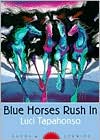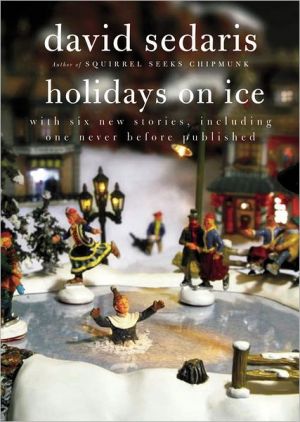Blue Horses Rush In: Poems and Stories
Wrapped in blankets and looking at the stars, a young Navajo girl listened long ago to stories that would guide her for the rest of her life. "Such summer evenings were filled with quiet voices, dogs barking far away, the fire crackling, and often we could hear the faint drums and songs of a ceremony somewhere in the distance," writes Luci Tapahonso in this compelling collection. Blue Horses Rush In takes its title from a poem about the birth of her granddaughter Chamisa, whose heart "pounded...
Search in google:
Wrapped in blankets and looking at the stars, a young Navajo girl listened long ago to stories that would guide her for the rest of her life. "Such summer evenings were filled with quiet voices, dogs barking far away, the fire crackling, and often we could hear the faint drums and songs of a ceremony somewhere in the distance," writes Luci Tapahonso in this compelling collection. Blue Horses Rush In takes its title from a poem about the birth of her granddaughter Chamisa, whose heart "pounded quickly and we recognized / the sound of horses running: / the thundering of hooves on the desert floor." Through such personal insights, this collection follows the cycle of a woman's life and underlines what it means to be Navajo in the late twentieth century. The book marks a major accomplishment in American literature for its successful blending of Navajo cultural values and forms with the English language, while at the same time retaining the Navajo character. Here, Luci Tapahonso walks slowly through an ancient Hohokam village, recalling stories passed down from generation to generation. Later in the book, she may tell a funny story about a friend, then, within a few pages, describe family rituals like roasting green chiles or baking bread in an outside oven. Throughout, Tapahonso shares with readers her belief in the power of pollen and prayer feathers and sacred songs. Many of these stories were originally told in Navajo, taking no longer than ten minutes in the telling. "Yet, in recreating them, it is necessary to describe the land, the sky, the light, and other details of time and place," writes Tapahonso. "In this way, I attempt to create and convey thesetting for the oral text. In writing, I revisit the place or places concerned and try to bring the reader to them, thereby enabling myself and other Navajos to sojourn mentally and emotionally in our home, Dinétah."Publishers WeeklyAmong the multitude of anthropological volumes detailing Navajo religion, ceremonies and taboos, too few books describe daily life for the Din. In this uneven, slender collection of 28 stories, essays and poems, Navajo woman Tapahonso (Sanii Dahatall/The Women Are Singing) begins to fill the gap, emphasizing the place of women and mothers in Navajo society. The best of these pieces (such as "White Bread Girl," a mother's memories of her runaway daughter) transcend culture to tell a universal tale. Less successful stories and poems meander, settling for merely anecdotal depictions of Tapahonso's Southwest, but even these weak spots inspire admiration for Tapahonso's efforts to sustain and report the traditions of her people. (Aug.)
PrefaceShisoi3A Song for the Direction of North5'Ahidziskeii7Tsaile April Nights9In Praise of Texas11Starlore15I Know It17Rain in the Desert21Conversations at the Gila River Arts Center23Daane'e Dine27Dust Precedes the Rain31It Was33Notes for the Children35This Is How They Were Placed for Us39Above the Canyon Floor43The Ground Is Always Damp49No Denials from Him53I Remembered This One in Tucson57White Bead Girl61Skradena and the Candles73A Birthday Poem79All the Colors of Sunset81She Was Singing in the Early Morning89The Guy93Sometimes on Summer Evenings95They Moved over the Mountain101Blue Horses Rush In103Notes105
\ From the PublisherWinner of the Mountains & Plains Booksellers Association's 1998 Regional Book Award for Adult Nonfiction""A poignant collection of stories and poems celebrating the joys and sorrows of everyday life. . . . Deeply entrenched in the author's Navajo heritage, these stories and poems speak to women of all cultures." —Library Journal"A totally engrossing narrative. Her writing is honest and straightforward, and yet so beautiful, so deep, so moving." —Books of the Southwest"Filled with rich natural images, her writing recites meaningful events that can guide a reader feeling lost in our confusing, hi-tech world. . . . A memorable book!" —Book Talk"These wise and perceptive 'observations and experiences,' as she calls them, cover a broad range of subjects: language and life and death, family and love and respect, and Navajo ways of finding beauty and harmony and even joy in a world that has too much misfortune in it." —Bloomsbury Review, a 1997 Editor's Choice\ \ \ \ \ \ Publishers Weekly - Publisher's Weekly\ Among the multitude of anthropological volumes detailing Navajo religion, ceremonies and taboos, too few books describe daily life for the Din. In this uneven, slender collection of 28 stories, essays and poems, Navajo woman Tapahonso Sanii Dahatall/The Women Are Singing begins to fill the gap, emphasizing the place of women and mothers in Navajo society. The best of these pieces such as "White Bread Girl," a mother's memories of her runaway daughter transcend culture to tell a universal tale. Less successful stories and poems meander, settling for merely anecdotal depictions of Tapahonso's Southwest, but even these weak spots inspire admiration for Tapahonso's efforts to sustain and report the traditions of her people. Aug.\ \ \ Tapahonso A Breeze Swept Through, West End, 1987 presents a poignant collection of stories and poems celebrating the joys and sorrows of everyday life. Some bring belly laughs, such as "I Remembered This One in Tucson," which tells of a young wife and mother's search for independence through the purchase of a used convertible. Others produce tears: In "White Bead Girl," a mother reviewing the life of the daughter who's run away is comforted by her father's words: "Once you remember something it never leaves you. It's how we know that we have lived." The title poem honors the birth of a grandchild who "arrived amid a herd of horses," bringing together the pasts of her ancestors. Although deeply entrenched in the author's Navajo heritage, these stories and poems speak to women of all cultures. Recommended for Native American and women's studies collections, with rewards for the general reader as well.Debbie Bogenschutz, Cincinnati Technical Coll., Ohio\ \








